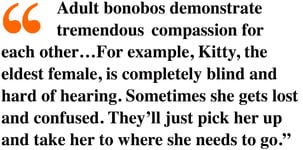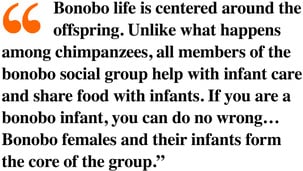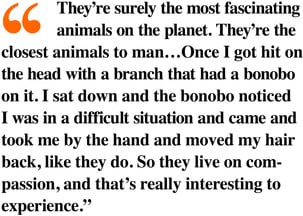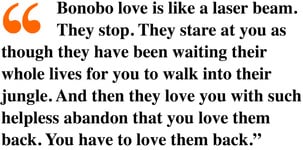that is needed to produce a psychologically upset state in a species is for it to become fully conscious, because that self-adjusting capability will naturally have to defy the non-insightful, intolerant, dictatorial instincts. It doesn’t matter what the particular orientation of the species’ instincts is, the fact that instincts are not insightful means that an upsetting clash with the insight-based, self-adjusting conscious mind has to occur. So irrespective of a species’ instinctive orientation, if it develops a fully conscious mind an upsetting battle has to occur between those instincts and the conscious mind.
Charles Darwin recognised our distinctive moral nature when he wrote that ‘The moral sense perhaps affords the best and highest distinction between man and the lower animals’. What is so significant about humans having cooperative, selfless and loving moral instincts is that when we became fully conscious, and began experimenting in understanding, and were criticised by our instincts and unavoidably responded in an angry, egocentric and alienated way, that divisive response caused even greater criticism from our instincts because they expected us to behave cooperatively, selflessly and lovingly. In our necessary search for understanding we were firstly unjustly condemned for defying our instincts, and then again for reacting to that condemnation in a way that was counter and offensive to our instincts. We had to endure a ‘double whammy’ of criticism when we became conscious!
Similar acknowledgements of our species’ past cooperative and loving existence which became corrupted when we became conscious can be found in other religions. For example, Zen Buddhism speaks of the loss of an uncontaminated, pure state as a result of the intervening conscious mind, referring to ‘the affective contamination (klesha)’ or ‘the interference of the conscious mind predominated by intellection (vijñāna)’. And Taoist scripture features a description of our distant forebears as being ‘the Men of Perfect Virtue’. Indeed, as the American author Richard Heinberg points out in his book Memories & Visions of Paradise, every human culture has a myth involving both the emergence of consciousness and a ‘fall’ from an original ‘Golden Age’ of togetherness and peace. As Heinberg summarised in the second edition (1990) of his book, ‘Every religion begins with the recognition that human consciousness has been separated from the divine Source, that a former sense of oneness…has been lost…everywhere in religion and myth there is an acknowledgment that we have departed from an original…innocence and can return to it only through the resolution of some profound inner discord…the cause of the Fall is described variously as disobedience, as the eating of a forbidden fruit [from the tree of knowledge], and as spiritual amnesia [forgetting, blocking out, alienation/psychosis]’. Again, that ‘resolution of some profound inner discord’ between our ‘separated’ ‘original’ state of ‘innocence’ and ‘conscious’ mind depended on science providing insight into the way genes and nerves work.
To explain what is so significant about a mother’s nurturing of her offspring, I first need to point out that a mother’s maternal instinct to care for her offspring is selfish because she is ensuring the reproduction of her genes by looking after her offspring who carry her genes. So maternalism is a selfish trait, which, as I’ve just said, genetic traits normally have to be for them to reproduce and carry on into the next generation. HOWEVER, and this is all-important, from the infant’s perspective maternalism does have the appearance of being selfless. From the infant’s perspective, it is being treated unconditionally selflessly—the mother is giving her offspring food, warmth, shelter, support and protection for apparently nothing in return. So it follows that if the infant can remain in infancy for an extended period and be treated with a lot of seemingly altruistic love, it will be indoctrinated with that selfless love and grow up to behave accordingly.
And if we think about primates, being semi-upright from living in trees, and thus having their arms free to hold a dependent infant, it’s clear that they are especially facilitated to support and prolong the mother-infant relationship, and so develop this nurtured, loving, cooperative behaviour. And in fact, the bonobo variety of chimpanzees, who live south of the Congo River in Africa, are extraordinarily matriarchal, or female role focused, and extraordinarily nurturing, as the following photos illustrate, and as a result bonobos are the most cooperative and loving of all primates, which the following quotes evidence. And bonobos are also our closest living relatives, sharing 98.7% of our DNA. So we can see that bonobos provide the perfect evidence for how our distant ape ancestors became cooperative and loving.
Charles Darwin recognised our distinctive moral nature when he wrote that ‘The moral sense perhaps affords the best and highest distinction between man and the lower animals’. What is so significant about humans having cooperative, selfless and loving moral instincts is that when we became fully conscious, and began experimenting in understanding, and were criticised by our instincts and unavoidably responded in an angry, egocentric and alienated way, that divisive response caused even greater criticism from our instincts because they expected us to behave cooperatively, selflessly and lovingly. In our necessary search for understanding we were firstly unjustly condemned for defying our instincts, and then again for reacting to that condemnation in a way that was counter and offensive to our instincts. We had to endure a ‘double whammy’ of criticism when we became conscious!
Similar acknowledgements of our species’ past cooperative and loving existence which became corrupted when we became conscious can be found in other religions. For example, Zen Buddhism speaks of the loss of an uncontaminated, pure state as a result of the intervening conscious mind, referring to ‘the affective contamination (klesha)’ or ‘the interference of the conscious mind predominated by intellection (vijñāna)’. And Taoist scripture features a description of our distant forebears as being ‘the Men of Perfect Virtue’. Indeed, as the American author Richard Heinberg points out in his book Memories & Visions of Paradise, every human culture has a myth involving both the emergence of consciousness and a ‘fall’ from an original ‘Golden Age’ of togetherness and peace. As Heinberg summarised in the second edition (1990) of his book, ‘Every religion begins with the recognition that human consciousness has been separated from the divine Source, that a former sense of oneness…has been lost…everywhere in religion and myth there is an acknowledgment that we have departed from an original…innocence and can return to it only through the resolution of some profound inner discord…the cause of the Fall is described variously as disobedience, as the eating of a forbidden fruit [from the tree of knowledge], and as spiritual amnesia [forgetting, blocking out, alienation/psychosis]’. Again, that ‘resolution of some profound inner discord’ between our ‘separated’ ‘original’ state of ‘innocence’ and ‘conscious’ mind depended on science providing insight into the way genes and nerves work.
To explain what is so significant about a mother’s nurturing of her offspring, I first need to point out that a mother’s maternal instinct to care for her offspring is selfish because she is ensuring the reproduction of her genes by looking after her offspring who carry her genes. So maternalism is a selfish trait, which, as I’ve just said, genetic traits normally have to be for them to reproduce and carry on into the next generation. HOWEVER, and this is all-important, from the infant’s perspective maternalism does have the appearance of being selfless. From the infant’s perspective, it is being treated unconditionally selflessly—the mother is giving her offspring food, warmth, shelter, support and protection for apparently nothing in return. So it follows that if the infant can remain in infancy for an extended period and be treated with a lot of seemingly altruistic love, it will be indoctrinated with that selfless love and grow up to behave accordingly.
And if we think about primates, being semi-upright from living in trees, and thus having their arms free to hold a dependent infant, it’s clear that they are especially facilitated to support and prolong the mother-infant relationship, and so develop this nurtured, loving, cooperative behaviour. And in fact, the bonobo variety of chimpanzees, who live south of the Congo River in Africa, are extraordinarily matriarchal, or female role focused, and extraordinarily nurturing, as the following photos illustrate, and as a result bonobos are the most cooperative and loving of all primates, which the following quotes evidence. And bonobos are also our closest living relatives, sharing 98.7% of our DNA. So we can see that bonobos provide the perfect evidence for how our distant ape ancestors became cooperative and loving.




No comments:
Post a Comment